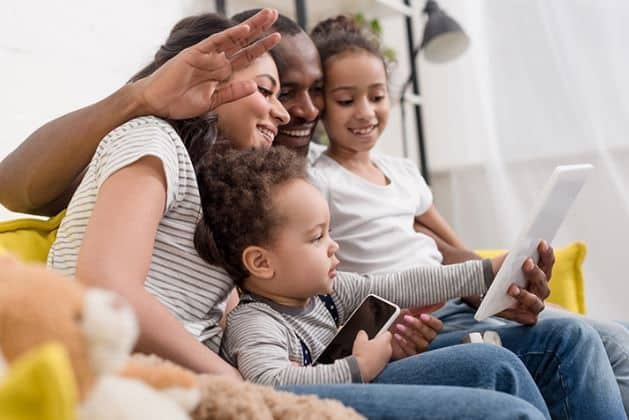
Each week I have been writing small posts on topics parents may find useful. This week I thought we might talk briefly about screen time and the effects it can have on our children’s development both positive and negative.
In a world where technology is everywhere, computers, mobile phones, and other forms of technology are an integral part of our everyday life, as a parent you’ve probably been concerned about the amount of screen time your child is exposed to and the effects it has on their health and development. Yes, we all know the importance of placing limitations on it, but as a parent, if I’m being completely honest, I have relied on some sort of screen time to save my sanity when my daughter was young. For example allowing her to sit and watch one of her favourite TV programmes or videos,( yes, videos, it was a long time ago, before the invention of DVD’s or the internet), whilst I got dinner ready or to keep her occupied and entertained during the school holidays, sometimes nothing does the job quite like some good old screen time and that’s fine, but just how much screen time should we be allowing our children to have and what effects does it have on their development both physically and mentally?

So what are the benefits of children using technology?
Allowing your child to use, developmentally and age appropriate technology can be empowering for them and can help young children grow, learn and develop new skills especially when parents and families play an active role.
Access to a wealth of information
Before the invention of computers and the internet, parents, friends, school, the wider community, including libraries with real books! would have been the only gateways to learning for children. Now the World Wide Web gives them a vast library of material to allow them to discover new things. Children can use technology to explore new worlds express their creativity and stay connected to others, and actively engage in fun and challenging activities.
There’s a lot of great educational content online that encourages children to participate, engage and interact with what they’re viewing. Rather than just being a passive observer. Technology such as the internet and computers help children develop research skills that are essential for their learning as they head into their school years and beyond. Learning how to use search engines and navigating their way around a computer is a valuable skill, teaching children how to explore and navigate online, analyse the reliability of what they find, and get deeper into the subject they’re researching.
Hand-eye coordination
Educational games that require children to follow objects and interact with them can help their hand eye coordination, also their understanding of how to interact with systems, for example knowing that pressing the right button will cause the desired action (cause and effect).
Language Skills
Knowing they can ask the computer anything they want to know drives a child’s desire to do research, many children will use their voice to enter their search queries into search engines, and then need to read and evaluate the results that are presented. Over time their language will improve and they will become faster and more adept at finding the information they want. Face time, Zoom and other apps that allow children to talk to family and friends will also aid children’s language, communication and social skills.
Problem Solving
Interactive websites and games help children learn to solve problems as they work their way through the challenges presented to get to the next level. Even simply using the devices enhances their skills, learning how to solve problems like programs not working correctly or connection issues.
Children who are tech-savvy will also be better prepared for the workplace that will be predominantly digital.
Everything in Moderation
We want our children to be able to use technology competently, but as with anything, too much can be detrimental, and research shows this is the same for children and screen time. So how much is too much and how can we help our children have the right balance?

We all know what screen time can be a life line when we are trying to get things done, but we should be mindful to limit the amount of time our children spend in front of the screen, and make sure it is mixed in with a healthy amount of other activities such as exercise, playing, reading, and human interaction.
Research has shown that children spend more time using electronic media devices than they do on any other activity an average of 7 hours a day, according to the American Academy of Paediatrics. Spending too much time on screens has been linked to not getting enough sleep, poor grades, and a greater risk of obesity.
The American Academy of Paediatrics’ Screen Time Guidelines
- The AAP recommends that parents avoid any screen time for babies and children under 18 month, except when video chatting with family.
- For years, the American Academy of Paediatrics has recommended no more than two hours of screen time for children and teenagers, and absolutely no screen time for children under 2
- The AAP and other child health advocates have urged parents to limit screen time to no more than 1 hour a day of high-quality programming, for children aged 2 to 5.
Children under the age of 2 should have no screen time – The first two years of life are a time of rapid brain development. Children learn best at this critical time by interacting with others, playing and exploring. Time away from a screen encourages healthy physical and social development.
Unstructured playtime is more valuable for a young child’s developing brain than electronic media. Children under 2 are more likely to learn and remember information from a live presentation than they are from a video.
By age 2, children can benefit from some types of screen time, such as programmes with music, movement and stories. By watching together, you can help your child understand what he or she is seeing and apply it in real life. However, passive screen time shouldn’t replace reading, playing, problem-solving or face to face and social interactions with others.
Parents should also make sure their children don’t have too much screen time in one go, and that they have put down their device an hour before bed time. The blue light emitted from LCD screens has been shown to disrupt sleep by interfering with our natural body rhythms, blocking our bodies from creating the sleep hormone melatonin and research has also shown that too much screen time can affect children’s sleep, increase the risk of concentration problems, anxiety and depression, and lead to obesity because they do less physical exercise
Interactive is better that passive
Research shows that the benefits of technology are better when screen time is interactive rather than passive, and benefits are most great when it is supervised, and other interaction accompanies the activity, such as discussion or conversation. Use screen time as another one of those moments where you can engage with your child and find out what they’re exploring and learning by spending time with them while they are researching their school project online, or play a game with them. Don’t be a silent on looker!
The Royal College of paediatrics and child health say:
Our primary recommendation is that families should negotiate screen time limits with their children based upon the needs of an individual child, the ways in which screens are used and the degree to which use of screens appears to displace (or not) physical and social activities and sleep. We would also adopt the expert recommendation that screens are avoided for an hour before the planned bedtime.
There is a little evidence that any specific intervention can be applied across the population to reduce screen time. We have developed four key questions for families to use as a guide to examine their screen time:
- Is screen time in your household controlled?
- Does screen use interfere with what your family want to do?
- Does screen use interfere with sleep?
- Are you able to control snacking during screen time?
If a family can ask themselves (or be asked by others) these questions, and are satisfied with the answers, then they can be reassured that they are likely to be doing as well as they can with this tricky issue.
The problems with screens
As your child grows, keep in mind that too much or poor quality screen time has been linked to:
- Obesity
- Irregular sleep schedules and shorter duration of sleep
- Behavioural problems
- Loss of social skills
- Violence
- Less time for play
So, is technology ruining your child? The short answer is no, probably not. screen time isn’t all bad, as long as children are still engaging in physical activity and spending quality time socialising with family and friends and not spending all day watching TV or on their phones, and banning all screen time just isn’t realistic. As parents we just need to get the balance of human interaction and screen time right for our children.
Hope you found this helpful, I’m going for my walk now to get some quality outdoor time away from my screen.
Take care and see you all next week
Donna




